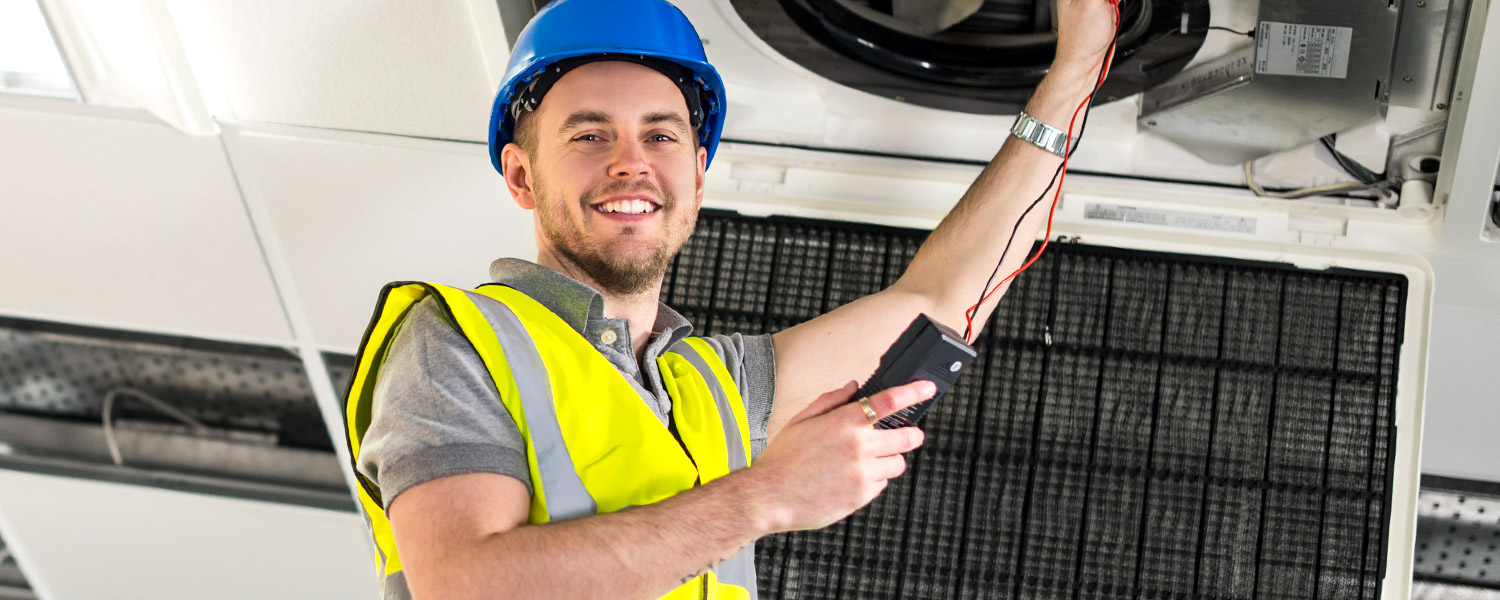The industry of heating, ventilation, and air conditioning (HVAC) is one that is currently booming. Those interested in becoming an HVAC technician will find a job market that promises to only grow as the years pass. In fact, the job outlook for this particular job shows an increase in demand of roughly 34% from 2010 to 2020 (as noted in the Explore the Trade hyperlink above and cited from the BLS). With the increasing prevalence of climate-control systems, constantly progressing technology, and the need for maintenance and repair for those systems that are already installed, this is one skilled trade that looks like it will be around for the long haul.
Qualified HVAC technicians maintain, repair, and install cooling and heating systems in both commercial and residential facilities. They will find themselves facing a career that is ripe with fair compensation, exciting opportunities, and rewarding work, as well as one that offers steady work and even some great overtime and incentive pay when extreme temperatures roll around. The average pay per hour for an HVAC technician is $20.21, with the highest paying skills being Commercial and Controls. This information, available via the link above, comes from PayScale.com.
It is important to keep in mind that while the exact requirements for this kind of work might vary from state to state, it is generally necessary to obtain a license in order to work in the HVAC field. If you are considering pursuing a career as an HVAC technician, you might wonder where to begin. Let’s take a look at some easy steps to take in order to get the process started.
Research the Profession
The first action to take is to carefully research the industry. Make sure that you understand the common skills that are needed in order to succeed, and to ensure that you would enjoy the work itself. These include the following:
- Customer-Service Skills
- Mechanical Skills
- Time-Management skills
- Trouble Shooting Skills
- A Solid Education
- Physical Strength
How does that list look to you? If these seem like skills that you have or wouldn’t mind acquiring, then you might be a great candidate for an HVAC license! Being able to make an informed decision about whether or not this is the right job for you will help you have plenty of confidence and ambition as you work your way towards your license.
You should understand that HVAC skilled trade technicians can do a variety of different work. Some might focus their efforts on inspection and maintenance, while others might prefer to focus on the installation of cooling and heating systems. Technicians also work in various environments, including homes, schools, factories, office buildings, and hospitals. Depending upon your personal skills and abilities, you might find yourself traveling throughout the day to answer service calls, or you might work at a fixed location for the duration of a project.
Most HVAC technicians work full time, and the majority tend to do so for HVAC contractors. The peak seasons for technicians tends to be during the summer and during the winter, however, when extreme temperatures necessitate the use of cooling or heating, respectively.
Find a Qualified Training Program
After you have a handle on the job itself, it is time to take a look around and find the best educational option. Briefly mentioned above, it is necessary to complete career training in order to become a licensed HVAC technician – and with the increasing complexity and sophistication of modern HVAC systems, many employers favor individuals who have taken the time to complete either a training program or a degree program. This helps grant them the peace of mind of knowing that their employees are able to wholly understand the ways that the HVAC systems in question work, and make the employees themselves more valuable in the long run thanks to their advanced knowledge and skills.
For just about any program, it is necessary to have completed a high school education or its equivalent, like a GED, to enroll. Speak with the advisors or faculty on hand if you have any questions about your eligibility to enroll in the program. In order to find the best education option for your needs, it is important to make sure that the HVAC program is thorough. You want a complete education that offers comprehensive career training, in other words, not one that is only mildly useful for a few very specific situations. The program should be clear and should outline exactly what to expect before you make the decision to commit. It is important to understand what is expected of you and, in turn, what you can expect from the educational facility offering the training.
Depending upon the kind of program you decide to pursue, your education could take anywhere from one to two years, not including an apprenticeship or internship that may that be required. Programs that result in diplomas or an associate’s degree, might take a bit longer than programs that do not. Keep in mind, however, that the specialized and detailed experience that you acquire during the process might give you a bit of an advantage when it comes to finding a great job. It may also help you prepare for the certification exam, which is a required part of the certification and, ultimately, the employment process.
Take the Certification Examination
After you have completed your education, you will need to focus on the certification exam. In order to successfully pass the exam, you will need to make use of the information you have learned in all aspects of the installation and repair of HVAC systems. The exact exam content might differ depending upon where you take the test, however, the general content is the same. In addition to demonstrating your knowledge in the aforementioned aspects, you might also need to have a good knowledge of electrical codes.
Depending upon whether or not you are also hoping to work with refrigerants, you might also need to sit for a second written exam. This one would focus more closely upon information pertinent to refrigerants. If you choose to specialize within the HVAC-R industry, you will need to take additional exams proving your knowledge, career training, and ability to successfully carry out the work involved.
These are the main steps you need to follow in order to become a licensed HVAC technician! After you have completed all of them, it is time to look forward to your interviews. To learn more about Penn Commercial Business/Technical School and how we can help you in your quest to become an HVAC technician, take a look at our website today!



![5 Reasons to pursue a Healthcare Care-1280×720[2]](https://penncommercial.edu/wp-content/uploads/2024/10/5-Reasons-to-pursue-a-Healthcare-Care-1280x7202-1-150x150.jpg)